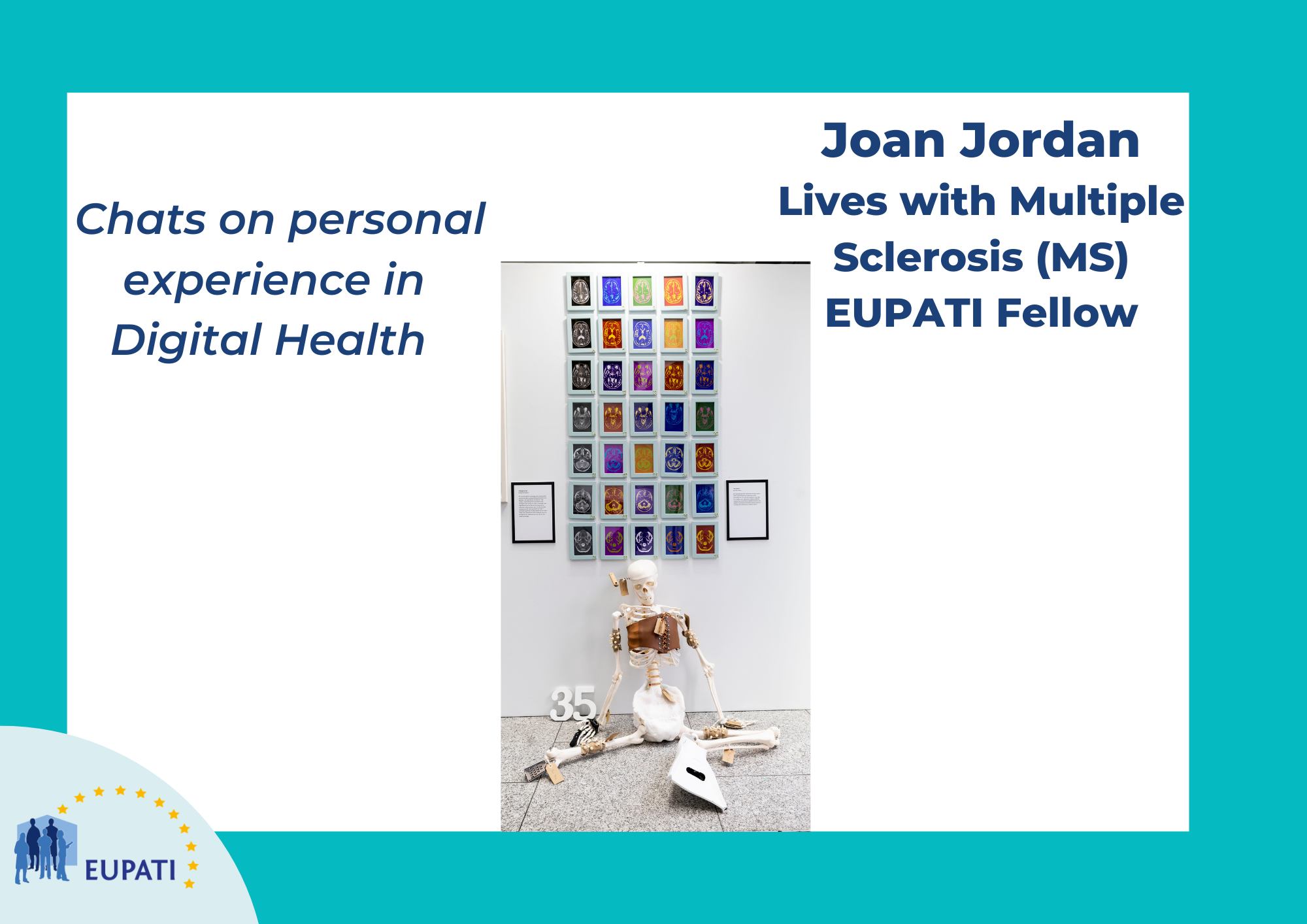
Joan Jordan lives with Multiple Sclerosis (MS). She had been experiencing unexplained and painful symptoms for more than a decade before she was diagnosed in 2010. This life-changing condition shifted her work from being a software engineer working all over the world to advocating for patients, all over the world. Her work is led by an unwavering determination to be involved in the decisions affecting her family’s quality of life. Connect with Joan on LinkedIn here.
Joan became a EUPATI Fellow in 2016 as part of Cohort 2 and has been flying the EUPATI flag ever since. We managed to catch up with Joan recently to chat about her take on why patients as partners in the medicines R&D is so important and her personal experience of patient engagement in Digital Health.
Could you tell us a few words about yourself and your journey in patient engagement?
It all started when I enrolled in a clinical trial for a Multiple Sclerosis treatment. Following this, I wanted to know more. I didn’t want to stand on the sidelines, cheering researchers on. I wanted to get involved. I followed the EUPATI Patient Expert course (now called EUPATI Patient Expert Training Programme) and have never looked back.
My proudest moment was working on a level setting on a paper on recruitment for Randomised Control Trials. I want to help make life better for patients and to use my experience in Information Technology (I.T.), my participation in a clinical trial, my communication skills, my time living abroad and most importantly, knowing what it is like to live with an illness for which there is currently no cure to help find one. I believe that the patient has an important role to play in this challenge and strive to ensure patient-centricity is at the core of health care. Nothing about us without us!
How did you become involved with EUPATI?
I was in cohort 2 – which was back in the very early days. Some of my patient advocate friends were talking about the course on social media and I felt that it was exactly what I needed to help fill in the blanks in my Medicines R&D knowledge. I really wanted to get a place on the training, so I spent about a month and used every allocated word to make my application as good as possible!
What is your personal experience of patient engagement in Digital Health?
Digital health is not very advanced in Ireland. I attended Trinity College, Dublin and graduated in 1995 as a Computer Scientist. I had experienced Multiple Sclerosis symptoms from the age of 22 but did not get diagnosed until I was 36. I could have been on treatment during this time.
A few years ago, in order to view a copy of my own MRI, I bought an external drive to read the CD software. It’s not the 80’s anymore! In May 2023, I was a finalist in the Multiple Sclerosis International Foundation Art Competition. My piece called 35 lesions uses examples of digital health and diagnostics to display how it can show invisible symptoms of Multiple Sclerosis. Many of my symptoms are “on the inside” and people tell me that I look fine. The installation is a physical manifestation of this experience. I wanted to make the shift from these symptoms being presented in a physiological manner to a more tactile one.
The backdrop is of pop-art style images of my 35 brain lesions. The interactive skeleton demonstrates how my symptoms feel in practical terms – from headaches to fatigue, the MS Hug, tingling, numbness, pain, and footdrop. The interactive nature of the piece means that people can make connections to understand what it is like to live with Multiple Sclerosis. If we share how to use digital methods we can connect to our communities to make things clearer.
For people who are not familiar with the term ‘Digital Health’ – could you explain what we mean by ‘Digital Health’?
I could try, but EUPATI does it much better! Check out their explanation on Digital Health here on the EUPATI Open Classroom. I was involved in the creation of this module and love the teamwork and expertise people willingly give.
According to you how has the Digital Health field changed in the last few years?
I am constantly amazed by innovations in Digital Health. Not everyone is moving at the same pace., My first child was born in the Netherlands. We had Electronic Health Records then, but still do not in Ireland. She is now 18! I see huge discrepancies even across Europe- not to mention the rest of the world.
What is crucial for the proper involvement of patients in Digital Health?
According to the WHO, Digital health investments should “address a health need, not duplicate existing tools or systems, be appropriate to the local context and account for long term costs”.
Patients should be involved right from the start, as equal partners with an equal voice. Personally, I see a lot of opportunity for patients to be engaged in digital health. When I was a software engineer, one of the most important principles was that we were creating what the customer wants and needs. It’s called user requirements.
What would you like to share with your fellow patient representatives about the Digital Health Module?
You are getting an incredible gift. Learn about it, use it and spread the word.
Date posted: June 28, 2023
Categories: Uncategorized



